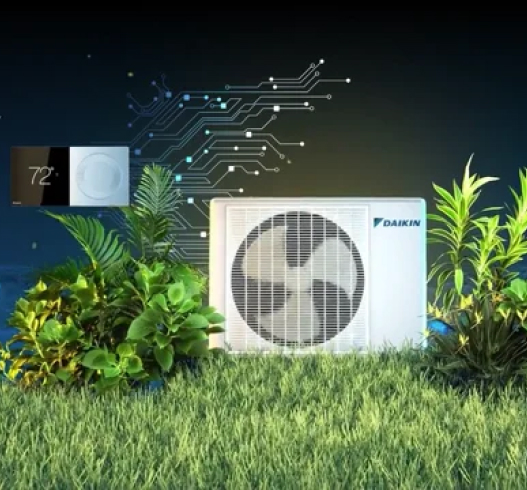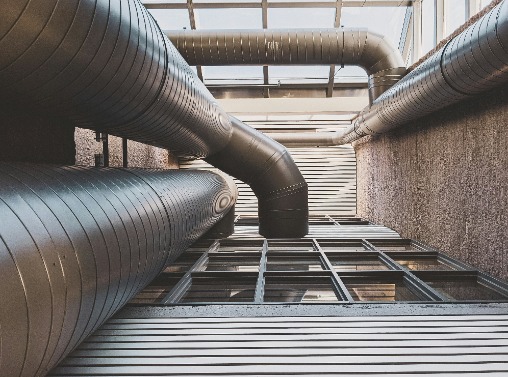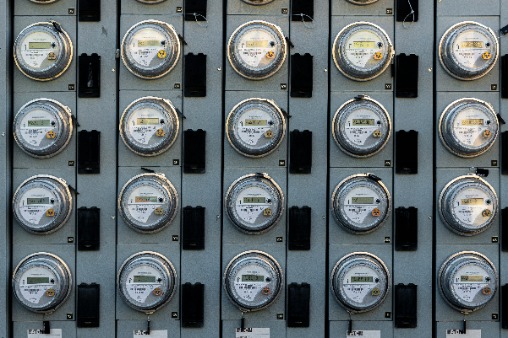Cold Climate Heat Pumps: Efficient Heating in Freezing Temps

Features to Look for in a Cold-Climate Heat Pump
Some manufacturers, like Daikin, have engineered select cold-climate heat pump systems specifically for very low ambient temperatures. This means the heat pump design incorporates a compressor, drain pan, coil, corrosion protection, and other features specifically designed for reliability and durability in harsh freeze/thaw conditions, ice, snow, and wind.
Cold climate heat pump features to look for include, but are not limited to:
• Variable-speed compressors that adjust to maintain a steady indoor temperature without constant cycling
• Built-in drain pan heater
• Corrosion-resistant coil with ambient sensors
• Strong defrost cycles to handle frost and ice buildup
• Hot-start technology
• A2L refrigerants, such as R-32, for outstanding heat transfer properties in low temperatures.
• ENERGY STAR® Cold Climate certification*
* To earn this designation, a heat pump must be tested and verified to meet standard ENERGY STAR requirements plus additional criteria specific to low-ambient (cold) performance. 1
Extended capacity in low ambient temperatures: In cold climates, a standard heat pump’s outdoor coil and refrigerant cycle can experience reduced capacity and efficiency as ambient temperatures drop.
Ambient temperature, when it comes to heat pumps, simply means the temperature of the air outside where the system is running.
So, if a heat pump says it works down to –13°F ambient temperature, that means it is designed to heat your house even when the air outside is that cold. A key metric to look for is that a heat pump maintains up to 100% of its rated heating capacity even at low outdoor temperatures.
Heat Pumps for Extremely Cold Days?
Efficiency
An all-electric heat pump can be very efficient, especially when a specific cold-climate heat pump is paired with proper insulation.
Instead of burning fuel to create heat, cold climate heat pumps move existing heat energy from the outside air into your home. This process allows heat pumps to produce up to four units of heat for every unit of electricity they use. In comparison, even very efficient gas furnaces can only convert up to 98% of their fuel into heat. The result is a system that is not only designed to save energy when converting heat but is also designed to reduce your energy use compared to high-efficiency gas furnaces or electric heaters when heating conditions are identical.
All-Electric Operation: No need for direct natural gas or oil to create heat. This makes heat pumps a great choice if you're trying to reduce your carbon footprint by moving away from fossil fuels and or moving toward an all-electric home.
Tax Incentives and Rebates: Many high-efficiency heat pump systems may qualify for the Inflation Reduction Act’s 25C tax credit, which offers a non-refundable tax credit of up to $2,000 for qualifying equipment placed into service on or before December 31, 2025, along with state and utility rebates.
(NOTE: Due to recent changes in law, the §25C Energy Efficient Home Improvement Credit will no longer be available for equipment placed into service after December 31, 2025.)
* Daikin Comfort Technologies Manufacturing, Inc. does not offer tax advice. This information is provided for discussion purposes only and is provided as a generic guideline. This information does not represent tax advice. Before filing for any tax credit with respect to these products, Daikin Comfort Technologies Manufacturing, Inc. recommends that consumers consult with a tax professional to determine the application of such credits to their particular situation.
In areas that regularly see sub-zero temperatures, many homeowners opt for a dual-fuel system, a heat pump paired with a backup furnace. The heat pump handles much of the heating, while the furnace kicks in only during extreme cold snaps, automatically switching between the two based on outdoor temperatures.
If you live in a region with chilly winters and moderate spring and fall temperatures, this system offers a balance of efficiency and comfort throughout the year. However, many locations have placed restrictions on fossil-fuel or oil-based heating systems for new construction, meaning the installation of cold-weather heat pumps could rise even further.
If you live in a region with chilly winters and moderate spring and fall temperatures, this system offers a balance of efficiency and comfort throughout the year. However, many locations have placed restrictions on fossil-fuel or oil-based heating systems for new construction, meaning the installation of cold-weather heat pumps could rise even further.
Examples Include:
• New York: Effective December 31, 2025, New York state will require new structures up to seven stories tall and, for commercial and industrial buildings, up to 100,000 square feet, to install electric heat pumps and stoves instead of gas appliances. 2
• Washington: In 2022, Washington became the first state to require all-electric heating in new buildings. A recently enacted state building code mandates that most new commercial buildings and large multifamily buildings install electric heat pumps. 3
• California: California's building codes, updated in 2022, strongly encourage new buildings to forgo gas hookups, effectively requiring the use of heat pumps for space heating. However, developers have the option to install other types of heating as long as they adopt a raft of energy efficiency measures.4
• Vancouver, Canada: By 2025, “all new and replacement heating and hot water systems in new low-rise residential buildings must be zero emission.”5
• Quebec, Canada: After Dec. 31, 2023, it will be illegal to replace existing furnaces with any sort of heating system powered by fossil fuels.6
The Adoption of the Cold-Climate Heat Pump
According to a Canadian Climate Institute1 April 2023 article, the number of heat pumps installed in Canadian homes had risen from 400,000 to 850,000 in the last 15 years. As of 2021, in the maritime provinces listed below, heat pumps were the primary heating source in a significant number of households.
• 32% of households in New Brunswick use heat pumps
• 27% of households in Prince Edward Island
• 21% of households in Nova Scotia
This report highlights the rapid adoption of heat pumps in these Maritime provinces, noting that the share of households using heat pumps as their primary heating system has increased significantly in recent years, driven by factors such as energy efficiency programs, government incentives, and the region’s climate suitability for heat pump technology.
Is a Cold Climate Heat Pump Right for Your Home?
Don’t let your ZIP code scare you away from considering an all-electric, cold-climate heat pump. Thanks to advances in technology, cold-climate heat pumps, like the Daikin FIT AURORA, are now a viable and efficient option for many northern homes. If you're considering upgrading your system or building a new home, a consultation with a licensed HVAC contractor can help determine the best fit.
NOTE: ENERGY STAR® and the ENERGY STAR mark are registered trademarks owned by the U.S. Environmental Protection Agency. ENERGY STAR products are third party certified by an EPA‐recognized Certification Body. Products that earn the ENERGY STAR prevent greenhouse gas emissions by meeting strict energy efficiency guidelines set by the U.S. Environmental Protection Agency. Proper sizing and installation of equipment is critical to achieve optimal performance. Split system air conditioners and heat pumps must be matched with appropriate coil components to meet ENERGY STAR criteria. Ask your contractor for details or visit www.energystar.gov.
1. ENERGY STAR, Air Source Heat Pumps, Why ENERGY STAR?. October 20, 2025.
2. Canadian Climate Institute, Heat pumps are hot in the Maritimes. April 23, 2023.
3. Grist, New York becomes the first state to commit to all-electric new buildings. August 3, 2025.
4. Cascade, PBS, Washington is the first state to require all-electric heating in new buildings, May 9, 2022.
5. RMI, Top Seven Building Decarbonization Wins You May Have Missed in 2022, December 14, 2022.
6. CBC, Why oil and gas heating bans for new homes are a growing trend. Feb 1, 2022.
7. CBC, Why oil and gas heating bans for new homes are a growing trend. Feb 1, 2022.
In this article
Connect on Social Media
 Follow on Facebook
Follow on Facebook
 Follow on YouTube
Follow on YouTube
 Follow on Instagram
Follow on Instagram
 Follow on X
Follow on X
 Follow on TikTok
Follow on TikTok
 Follow on Pinterest
Follow on Pinterest

Looking for help now?
Enter your zip code to search for Daikin Contractors in your area.
Learn More
Learning Center Content
Stay informed about home comfort technology, when to upgrade, energy efficiency, and reducing your energy bills.





























